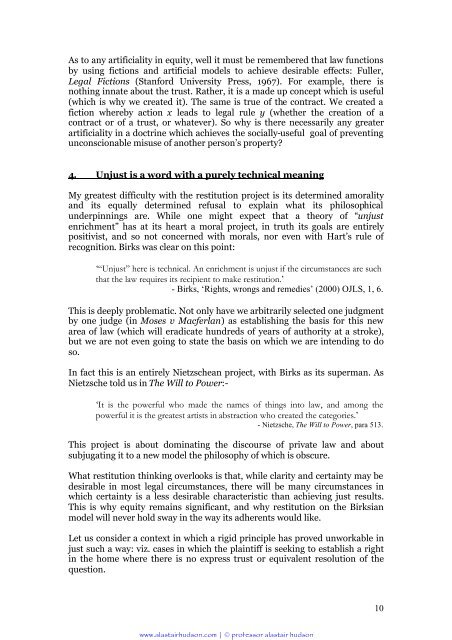As to any artificiality in <strong>equity</strong>, well it must be remembered that law functionsby using fictions <strong>and</strong> artificial models to achieve desirable effects: Fuller,Legal Fictions (Stanford University Press, 1967). For example, there isnothing innate about the <strong>trust</strong>. Rather, it is a made up concept which is useful(which is why we created it). The same is true of the contract. We created afiction whereby action x leads to legal rule y (whether the creation of acontract or of a <strong>trust</strong>, or whatever). So why is there necessarily any greaterartificiality in a doctrine which achieves the socially-useful goal of preventingunconscionable misuse of another person’s property?4. Unjust is a word with a purely technical meaningMy greatest difficulty with the restitution project is its determined amorality<strong>and</strong> its equally determined refusal to explain what its philosophicalunderpinnings are. While one might expect that a theory of “unjustenrichment” has at its heart a moral project, in truth its goals are entirelypositivist, <strong>and</strong> so not concerned with morals, nor even with Hart’s rule ofrecognition. Birks was clear on this point:‘“Unjust” here is technical. An enrichment is unjust if the circumstances are suchthat the law requires its recipient to make restitution.’- Birks, ‘Rights, wrongs <strong>and</strong> remedies’ (2000) OJLS, 1, 6.This is deeply problematic. Not only have we arbitrarily selected one judgmentby one judge (in Moses v Macferlan) as establishing the basis for this newarea of law (which will eradicate hundreds of years of authority at a stroke),but we are not even going to state the basis on which we are intending to doso.In fact this is an entirely Nietzschean project, with Birks as its superman. AsNietzsche told us in The Will to Power:-‘It is the powerful who made the names of things into law, <strong>and</strong> among thepowerful it is the greatest artists in abstraction who created the categories.’- Nietzsche, The Will to Power, para 513.This project is about dominating the discourse of private law <strong>and</strong> aboutsubjugating it to a new model the philosophy of which is obscure.What restitution thinking overlooks is that, while clarity <strong>and</strong> certainty may bedesirable in most legal circumstances, there will be many circumstances inwhich certainty is a less desirable characteristic than achieving just results.This is why <strong>equity</strong> remains significant, <strong>and</strong> why restitution on the Birksianmodel will never hold sway in the way its adherents would like.Let us consider a context in which a rigid principle has proved unworkable injust such a way: viz. cases in which the plaintiff is seeking to establish a rightin the home where there is no express <strong>trust</strong> or equivalent resolution of thequestion.10www.<strong>alastairhudson</strong>.<strong>com</strong> | © professor alastair hudson
5. Conscience-thinkers are fascists: the lesson from HeydrichThere was one argument marshalled against defenders of <strong>equity</strong> which, Iwould suggest, demonstrated an astonishing level of puerility, love of rhetoricfor its own sake, <strong>and</strong> historical insensitivity. That was the argument that thosewho advanced a notion of “<strong>conscience</strong>” were falling into the same trap as theauthors of the Nazi’s final solution.This argument is set out by Prof Steve Hedley in the following terms, (“Thetaxonomic approach to restitution”, in Hudson ed., New Perspectives on Property,Obligations <strong>and</strong> Restitution, Cavendish Publishing, 2004):-‘Indeed, a noticeable recent tendency [in restitution scholarship] has been toaccuse <strong>equity</strong> lawyers of being no better than Nazis. This (slightly surprising)argument relies on the point that, like one famous Nazi, they sometimes appealto <strong>conscience</strong>. It appears that Reinhard Heydrich, chief of the Gestapo <strong>and</strong>director of the ‘final solution’, once used justified his conduct by reference to his<strong>conscience</strong>.“For the fulfilment of my task I do fundamentally that for which I can answer to my<strong>conscience</strong> ... I am <strong>com</strong>pletely indifferent whether others gabble about breaking the law”(Quoted in AH Campbell ‘Fascism <strong>and</strong> legality’ (1946) 62 LQR 141, 147).This is, apparently, too un<strong>com</strong>fortably close to the reasoning employed by otherswho do not subscribe to restitution of unjust enrichment.’This argument has now be<strong>com</strong>e absurd. First, it says that <strong>conscience</strong> thinkingcan be jettisoned because it is capable of leading to Nazism. Oddly, everyonewho advocates <strong>conscience</strong>-thinking in <strong>equity</strong> seems as far from being a fascistas it is possible to get. Secondly, this argument is monumentally insensitive tothe memory of the Holocaust: to use the views of the author of the FinalSolution to score a cheap debating point is truly appalling.Now, I must admit at this point that I had found at one time another quotationattributed to Heydrich in which he suggested that order <strong>and</strong> clear rules were the mostimportant thing for any society. I found it entirely by accident one afternoon readingsomething other than law. I cannot now find it. I remember very well my joy ondiscovering it, recognising the perfect refutation of Birks’s point, setting it aside <strong>and</strong>settling myself back with a feeling of satisfaction. Lamentably, I tidied up my studysubsequently <strong>and</strong> cannot for the life of me remember where I put it.However, some good has <strong>com</strong>e of it. I launched a search of my home from top tobottom. I re-read at speed every book I suspected I had so much as opened during thatsummer. Ditto every article <strong>and</strong> fragment I could find. While doing so, I reencountereda number of better ideas than simply meeting one quotation with another.As though such a process would prove anything. Instead I spent a lot of time withHannah Arendt’s work <strong>and</strong> with Zygmunt Bauman’s work (two people I suspected ofharbouring the quotation I sought). In so doing I was required to think through whatwas so wrong with Birks’s approach from a methodological st<strong>and</strong>point <strong>and</strong> also, moreimportantly, to think again about why I consider <strong>equity</strong> to be quite so important.The real reason why Birks’s argument strikes me as being so stupid is that it suggestsan ignorance of the history of national socialism. The Nazis were painfully precise.11www.<strong>alastairhudson</strong>.<strong>com</strong> | © professor alastair hudson













